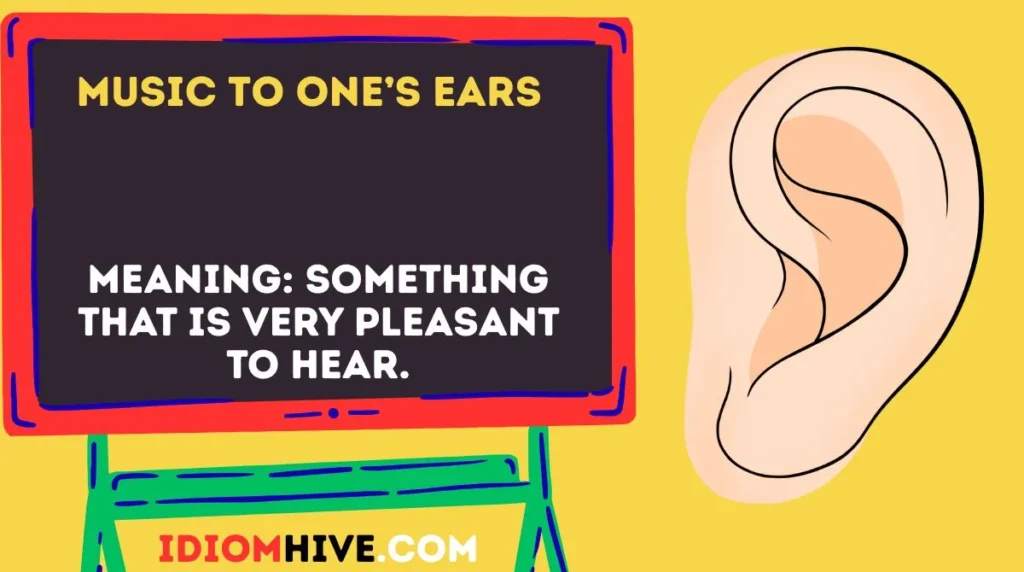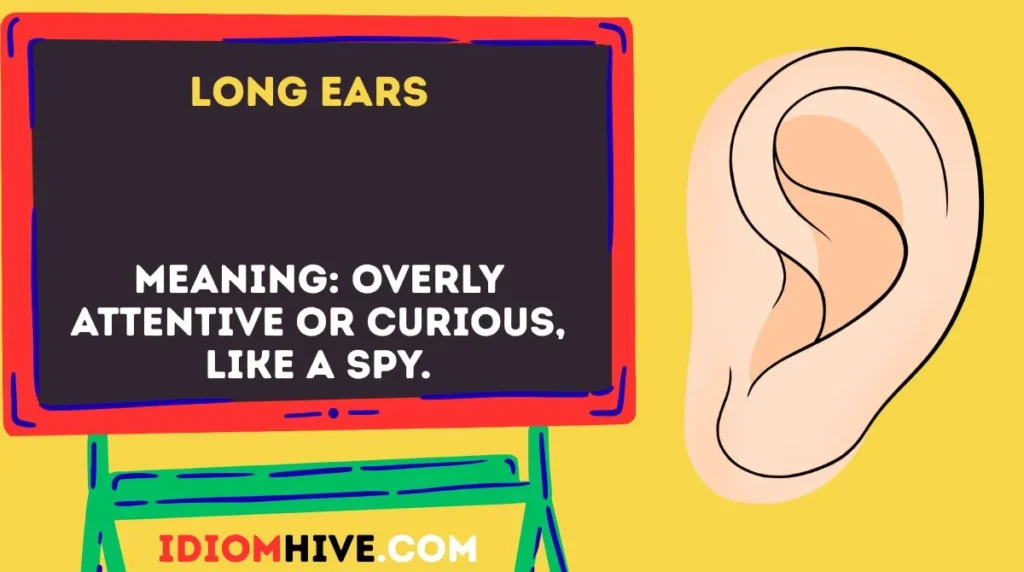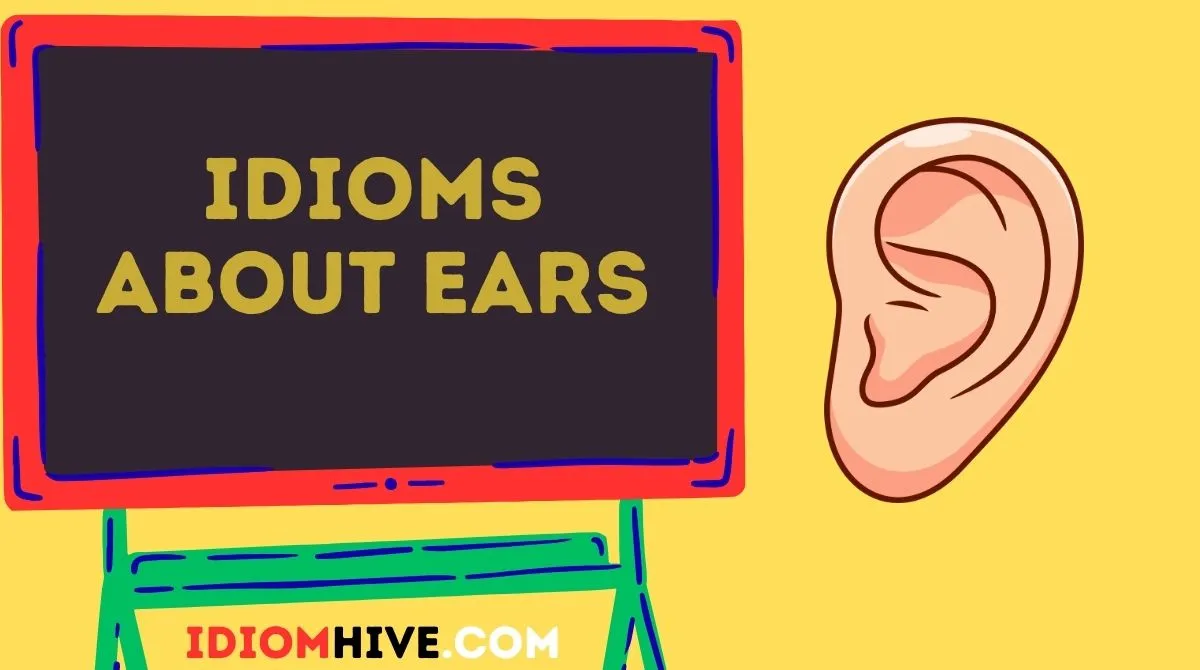Idioms are colorful expressions that make language more lively and interesting. They often use everyday words in ways that don’t match their literal meaning but instead carry a hidden cultural or figurative message.
Learning idioms helps English learners sound more natural, connect with native speakers, and add richness to both speaking and writing.
When it comes to the human body, especially ears, English has many idioms that reflect listening, ignoring, gossiping, or even learning secrets.
Since ears are connected to hearing and communication, idioms about ears are useful for expressing emotions, attitudes, and social situations in a fun and memorable way.
Mastering these ear-related idioms can help you understand conversations better and express yourself more effectively, whether in casual talks, storytelling, or professional communication.
Did You Know?
The phrase “lend me your ears” became famous through William Shakespeare’s play Julius Caesar. It’s a poetic way of asking people to listen carefully. This shows that idioms about ears have been around for centuries, symbolizing attention, listening, and communication.
Idioms About Listening and Attention
All Ears
Meaning: Paying full attention, eager to listen.
Example: “Tell me about your trip—I’m all ears!”
Similar Idiom: “I’m listening.”
Note: Informal, often used in friendly conversations.
Music to One’s Ears

Meaning: Something that is very pleasant to hear.
Example: “Her good news was music to my ears.”
Similar Idiom: “Sweet sound.”
Note: Used in both daily life and professional settings.
Fall on Deaf Ears
Meaning: To be ignored or not listened to.
Example: “His request for help fell on deaf ears.”
Similar Idiom: “Go unnoticed.”
Note: Common in both formal and informal contexts.
Lend an Ear
Meaning: To listen carefully or sympathetically.
Example: “She always lends an ear when I need advice.”
Similar Idiom: “Hear out.”
Note: Used in supportive or caring situations.
Keep Your Ears Open
Meaning: Stay alert and listen for information.
Example: “Keep your ears open for any job opportunities.”
Similar Idiom: “Be on the lookout.”
Note: Often used in professional or everyday advice.
Prick Up Your Ears
Meaning: Suddenly start listening with interest.
Example: “She pricked up her ears when she heard her name.”
Similar Idiom: “Pay attention.”
Note: Informal, usually used in storytelling.
Turn a Deaf Ear
Meaning: To refuse to listen.
Example: “He turned a deaf ear to her complaints.”
Similar Idiom: “Ignore.”
Note: Common in formal and informal usage.
In One Ear and Out the Other
Meaning: Heard but quickly forgotten.
Example: “The teacher’s advice went in one ear and out the other.”
Similar Idiom: “Forget instantly.”
Note: Informal, often about careless listening.
Play It by Ear
Meaning: Handle a situation as it happens, without a fixed plan.
Example: “We don’t know the exact schedule—we’ll play it by ear.”
Similar Idiom: “Go with the flow.”
Note: Common in casual conversations.
Grin from Ear to Ear
Meaning: Smile widely out of happiness.
Example: “He was grinning from ear to ear after getting the promotion.”
Similar Idiom: “Smile broadly.”
Note: Often used in storytelling or descriptions.
Idioms About Gossip and Secrets
Have Big Ears
Meaning: Be curious or nosy about other people’s conversations.
Example: “Don’t speak too loudly, kids have big ears.”
Similar Idiom: “Eavesdropper.”
Note: Informal, often playful.
Walls Have Ears
Meaning: Be careful, someone might be listening secretly.
Example: “Speak softly—the walls have ears.”
Similar Idiom: “Be cautious.”
Note: Common in warnings or advice.
To Eavesdrop
Meaning: To secretly listen to someone’s conversation.
Example: “He was caught eavesdropping outside the door.”
Similar Idiom: “Listen in.”
Note: Neutral to negative, used in everyday situations.
It’s Music to My Ears
Meaning: Hearing exactly what one wanted to hear.
Example: “Your praise is music to my ears.”
Similar Idiom: “Just what I needed to hear.”
Note: Positive and often used warmly.
Have Someone’s Ear
Meaning: To have someone’s attention and influence.
Example: “She has the boss’s ear, so her ideas get approved.”
Similar Idiom: “Be influential.”
Note: Often used in professional or political contexts.
Ears Are Burning
Meaning: When someone feels others are talking about them.
Example: “My ears were burning—were you discussing me?”
Similar Idiom: “Being gossiped about.”
Note: Informal and playful.
To Bend Someone’s Ear
Meaning: To talk for a long time, often annoyingly.
Example: “He bent my ear about his holiday plans.”
Similar Idiom: “Talk someone’s head off.”
Note: Informal, casual speech.
To Catch Someone’s Ear
Meaning: To gain someone’s attention.
Example: “The catchy song caught everyone’s ear.”
Similar Idiom: “Grab attention.”
Note: Neutral, used in daily life.
Give an Earful
Meaning: To scold or complain loudly.
Example: “The teacher gave the students an earful for being late.”
Similar Idiom: “Tell off.”
Note: Common in informal and semi-formal contexts.
Idioms About Emotions and Reactions
Wet Behind the Ears
Meaning: Inexperienced or naïve.
Example: “He’s still wet behind the ears in this profession.”
Similar Idiom: “Greenhorn.”
Note: Often used in workplaces.
Out on Your Ear
Meaning: To be dismissed, fired, or rejected.
Example: “He was out on his ear after missing deadlines.”
Similar Idiom: “Thrown out.”
Note: Informal, often professional context.
Up to Your Ears
Meaning: Extremely busy or overwhelmed.
Example: “I’m up to my ears in work right now.”
Similar Idiom: “Buried in work.”
Note: Used in both casual and professional life.
Blow It Out Your Ear
Meaning: A rude way to tell someone off.
Example: “He told the critic to blow it out his ear.”
Similar Idiom: “Get lost.”
Note: Informal and impolite.
Lead Someone by the Ear
Meaning: To control or dominate someone.
Example: “The manager leads his team by the ear.”
Similar Idiom: “Have authority over.”
Note: Semi-formal, often negative.
Long Ears

Meaning: Overly attentive or curious, like a spy.
Example: “That boy has long ears; he notices everything.”
Similar Idiom: “Nosy.”
Note: Informal and descriptive.
Hang on Someone’s Every Word
Meaning: Listen very carefully with admiration.
Example: “The students hung on the professor’s every word.”
Similar Idiom: “Absorb every detail.”
Note: Formal and respectful context.
Have Something Coming Out of Your Ears
Meaning: To have an excessive amount of something.
Example: “She has chocolates coming out of her ears.”
Similar Idiom: “Overflowing with.”
Note: Informal, often humorous.
Idioms About Hearing and Sound
Play by Ear
Meaning: To play music without written notes, using memory or instinct.
Example: “She can play the piano by ear.”
Similar Idiom: “Improvise.”
Note: Mostly used in music but also in general life.
To Have an Ear for Something
Meaning: To be talented at recognizing or understanding sounds/music.
Example: “She has an ear for languages.”
Similar Idiom: “Gifted.”
Note: Used in both formal and informal contexts.
To Be All Ears and Eyes
Meaning: To pay very close attention.
Example: “The kids were all ears and eyes during storytime.”
Similar Idiom: “Fully attentive.”
Note: Informal and descriptive.
To Have a Tin Ear
Meaning: To lack musical ability or sensitivity.
Example: “He loves singing but has a tin ear.”
Similar Idiom: “Tone-deaf.”
Note: Common in casual speech.
To Have an Earworm
Meaning: A catchy song stuck in one’s head.
Example: “That tune is such an earworm—I can’t stop humming it.”
Similar Idiom: “Stuck in my head.”
Note: Informal, everyday conversation.
To Keep One’s Ear to the Ground
Meaning: Stay informed and aware of trends or news.
Example: “Journalists keep their ears to the ground for new stories.”
Similar Idiom: “Stay alert.”
Note: Often used in professional and news contexts.
How to Use These Idioms in Daily Life
- Speaking: Use them in friendly conversations to sound natural. Example: “I’m up to my ears in work today.”
- Writing: Add idioms in stories, essays, or emails to make your text engaging. Example: “The proposal fell on deaf ears.”
- Professional Usage: Idioms like “keep your ear to the ground” or “have someone’s ear” work well in meetings and business reports.
Common Mistakes Learners Make With Idioms
- Wrong Placement
❌ *“I’m ears all.”
✅ “I’m all ears.” - Mixing Two Idioms
❌ *“His advice went out the other ear and in the other.”
✅ “His advice went in one ear and out the other.” - Using Idioms Too Literally
❌ *“He really turned his ear deaf.”
✅ “He turned a deaf ear.”
FAQs
1. Why are idioms about ears so common?
Because ears are connected with listening, attention, and communication, they naturally appear in expressions about daily life.
2. Can I use ear idioms in formal writing?
Yes, but choose carefully. Phrases like “fell on deaf ears” fit reports, while “up to my ears” is more casual.
3. Are ear idioms the same in British and American English?
Most are shared, though some may be more popular in one region than the other.
4. How can I remember idioms better?
Practice them in real conversations and connect them with images or stories.
5. Which is the most polite ear idiom?
“Lend an ear” is polite and caring, while “blow it out your ear” is impolite.
Conclusion
Idioms about ears show just how creative language can be. From listening carefully (all ears) to ignoring completely (turn a deaf ear), these phrases enrich everyday conversations.
They can make your speech sound more natural, add humor, or express emotions clearly. Whether you’re learning English for daily life, travel, or work, mastering these idioms will help you connect with people more effectively.
So, the next time you hear or read an ear idiom, smile and remember—you’ve got a good ear for English now!










